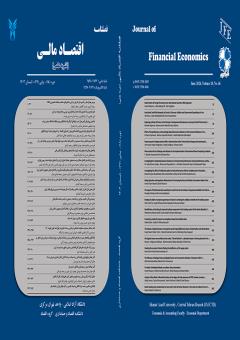the effects of changes in macroeconomic variables on the determination of salaries and wages in Iran
Subject Areas : Financial EconomicsNazi Mohammadzadeh Asl 1 * , Nazser Khani 2
1 - member of economic faculty
2 - Master of Economics
Keywords: Real wage, labor market, housing price index, literacy rate, services sector.,
Abstract :
Determining the minimum salary is considered as one of the most important changes in the labor market, and the labor force from the newly arrived labor force and the experienced labor force demands to receive a fair salary in order to have sufficient motivation to provide services. For this reason, the government determines one of the salaries, because I understand that it must determine a level of salary that guarantees the personal security of their work and their families. What is clear is that in Iran's economy, which has always been involved in high inflation, the level of wages has increased in line with inflation. therefore, in this research using the VAR model, the question has been raised as to whether changes in other variables, such as in the macroeconomic sector of the economy, have had an effect on wages or not. The variables used are the share of employees in the service sector, the added value of the service sector, the literacy rate of adults and the housing price index. The investigated time period is 1370 to 1399. The results of the model showed that practically none of the changes in the macroeconomic variables of the country had an effective contribution in determining the minimum salary and the process of determining the minimum salary is a repetitive process without considering the macroeconomic indicators
فهرست منابع
آرمن، سید عزیز؛ کفیلی، وحید؛ قربان نژاد، مجتبی؛(1393 ) ، بررسی رابطه دو سویه بین حداقل دستمزد و بیکاری، فصلنامه علمی پژوهشی مطالعات اقتصادی کاربردی ایران، سال 3، شماره 12، صفحات 221-236.
اوزجی، علاءالدین؛ امینی، علیرضا؛ (1387)، تحلیل و بررسی رابطه دستمزد و بهرهوری نیروی کار در صنایع ایران، یک مدل خودهمبسته با وقفه های توزیعی؛ فصلنامه پژوهش های اقتصادی ایران، سال 12، شماره 37، صفحات 73-97.
باوردی، عبدالقادر؛ 1391، بررسی مفهوم تورم و تاثیر متقابل آن بر سیستم حقوق و دستمزد پایه به عنوان یکی از مولفه هاي بازار کار، www.ensani.ir
پژويان، جمشيد و اميني عليرضا؛ (1380)، آزمون تجربي اثر قانون حداقل دستمزد بـر اشتغال گروههاي جمعيتي جوان در اقتصاد ايران، پژوهشنامه اقتصادي، شماره پيـاپي 2، صفحات 57-74.
سپهردوست، حمید؛ زمانی شبخانی، صابر؛ (1394)، بررسی اثر جبران خدمات بر بهرهوری نیروی کار تعاونی های صنعتی کشور، فصلنامه پژوهش های اقتصادی، سال شانزدهم، شماره 4، صفحات 193-211.
جوادی، صفورا، طایی، حسن،(1387) ، اثر حداقل دستمزد بر اشتغال در ضنایع کارخانه ای ایران، اقتصاد مالی، پیاپی 3، صفحات 1 -20
سوری، علی؛ ابراهیمی، محسن؛ حسینی دوست، احسان؛ (1387) ، رابطه بهرهوری و دستمزد با تاکید بر تحصیلات نیروی کار (مطالعه موردی صنعت ایران)، پژوهشنامه اقتصادی، سال 10، شماره 3، صفحات 311-329.
عباسی نژاد، حسین؛ تشکینی، احمد؛ رحمانی، تیمور، ستایش، هدیه؛( 1392) ، ارتباط متقابل بین حداقل دستمزد و تورم در اقتصاد ایران، مجله تحقیقات اقتصادی، دوره 48، شماره 2، صفحات 65-86.
عیسی زاده، سعید، و علمیان، راضیه. (1388). تحلیلی بر حداقل دستمزد و آثار اقتصادی آن. اقتصاد مالی (اقتصاد مالی و توسعه)، 3(9)، 129-142.
عیسی زاده، سعید، محمدی، عدنان، (1392)، مطالعه رابطه حداقل دستمزد بر فقر در ایران، فصلنامه علمی پژوهشی مطالعات اقتصادی کاربردی ایران، سال 2، شماره 5، صفحات 121-143.
کازرونی، علیرضا؛ محمدی، علیرضا؛ (1386) ، بررسی رابطه بین بهرهوری و دستمزد در بخش صنعتی ایران، فصلنامه پژوهشهای اقتصادی ایران، سال 9، شماره 31، صفحات 127 – 150.
کردبچه، حمید، احمدی، زهرا، شاه آبادی ابوالفضل، (1395)، آیا اثر افزایش حداقل دستمزدها بر تورم در اقتصاد ایران به وضعیت ادوار تجاري اقتصاد کلان مرتبط است؟، فصلنامه تحقیقات مدلسازي اقتصادي شماره 2، صفحات 41-64.
مهرگان، نادر؛ اصغرپور، حسین؛ صمدی، رویا؛ پورعبادالهان، محسن؛ (1387)؛ رابطه حداقل دستمزد با توزیع درآمد در ایران، فصلنامه علمی پژوهشی رفاه اجتماعی، سال 9، شماره 33، صفحات 45 – 64.
مهرگان، نادر، رضائی، روح الله، (1387)، آيا حداقل دستمزد منجر به افزايش تورم ميشود؟، مجله تحقیقات اقتصادی، شماره 44، صفحات 253-266.
ولي زاده زنوز، پروین، (1384)، بررسي بهرهوری در اقتصاد ایران؛ مجموعه پژوهش های اقتصادی بانک مرکزی جمهوری اسلامی ایران، شماره 21.
یزدانی، فرشید، (1389)، حداقل دستمزد در ایران . فصلنامه گفتگو . شماره 55 . صص 155 – 1.
www.amar.org.ir
Brouillette, D., Cheung, C., GAO, D., & Gervais, O. (2017). The Impacts of Minimum Wage Increases on the Canadian Economy. Bank of Canada.
www.cbi.ir
www.data.worldbank.org
Dort-Verner, D., "Wage and Productivity in Zimbobwe, Affected by Human Capital Investment
Klein, N. (2012). Real Wage, Labor Productivity and Employment Trends in South Africa: A Closer Look. IMF Working Paper, 1-27.
www.mcls.gov.ir
Murray S. & Hugh M. (2007), Bringing Minimum Wages above the Poverty Line, Canadian Centre for Policy Alternatives / /http//www.gov.mb.ca
Seok BH, You HM, 2022, macroeconomic impacts of increasing the minimum wagw: the case of Korea, economic modelling, vol 113, August 2022, 105880.
Wakeford JJ (2004), productivity, wage, and employment in South Africa manufacturing sector, 1970 – 2002. Development policy research unit. Working paper 04/85.

